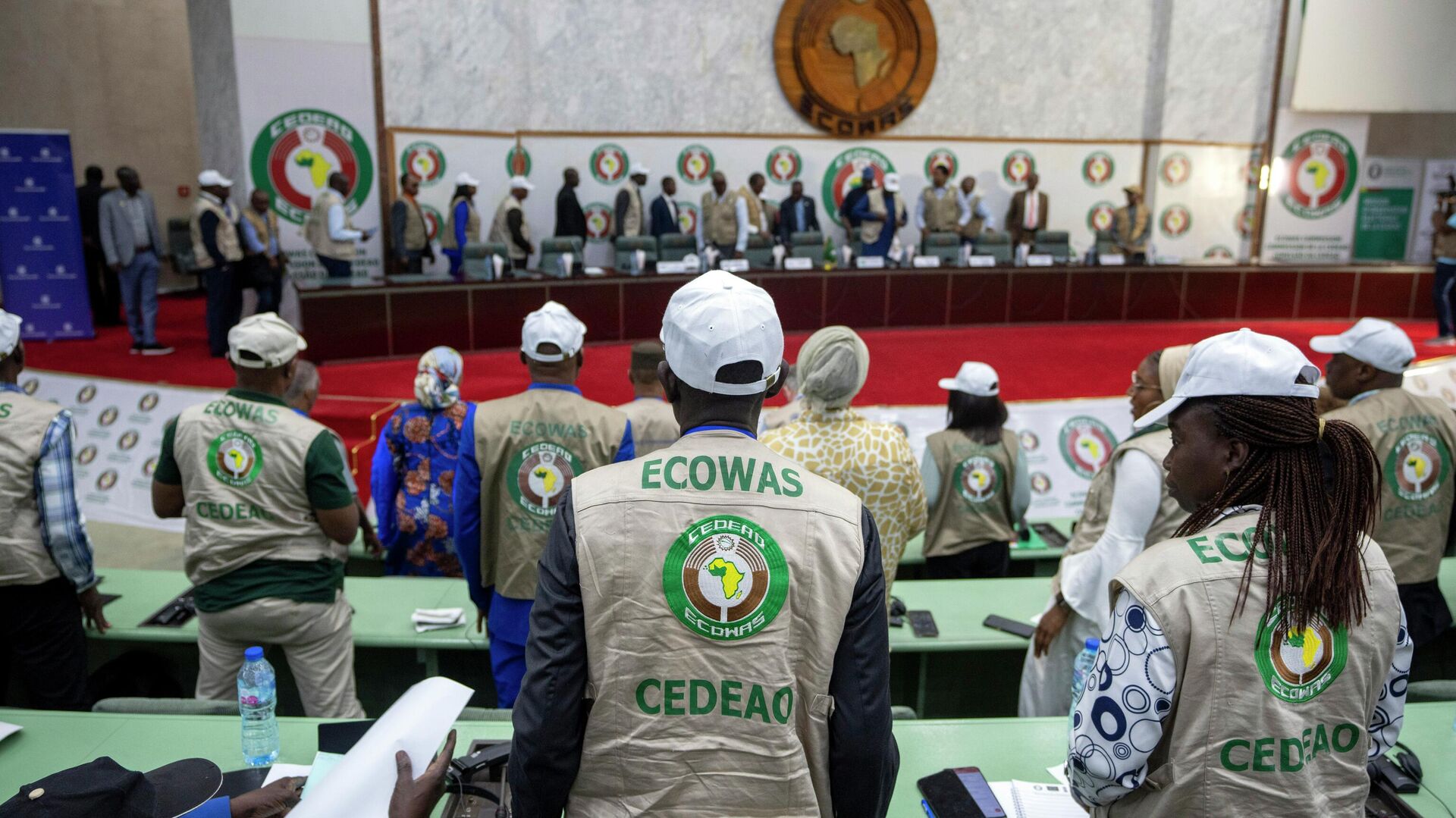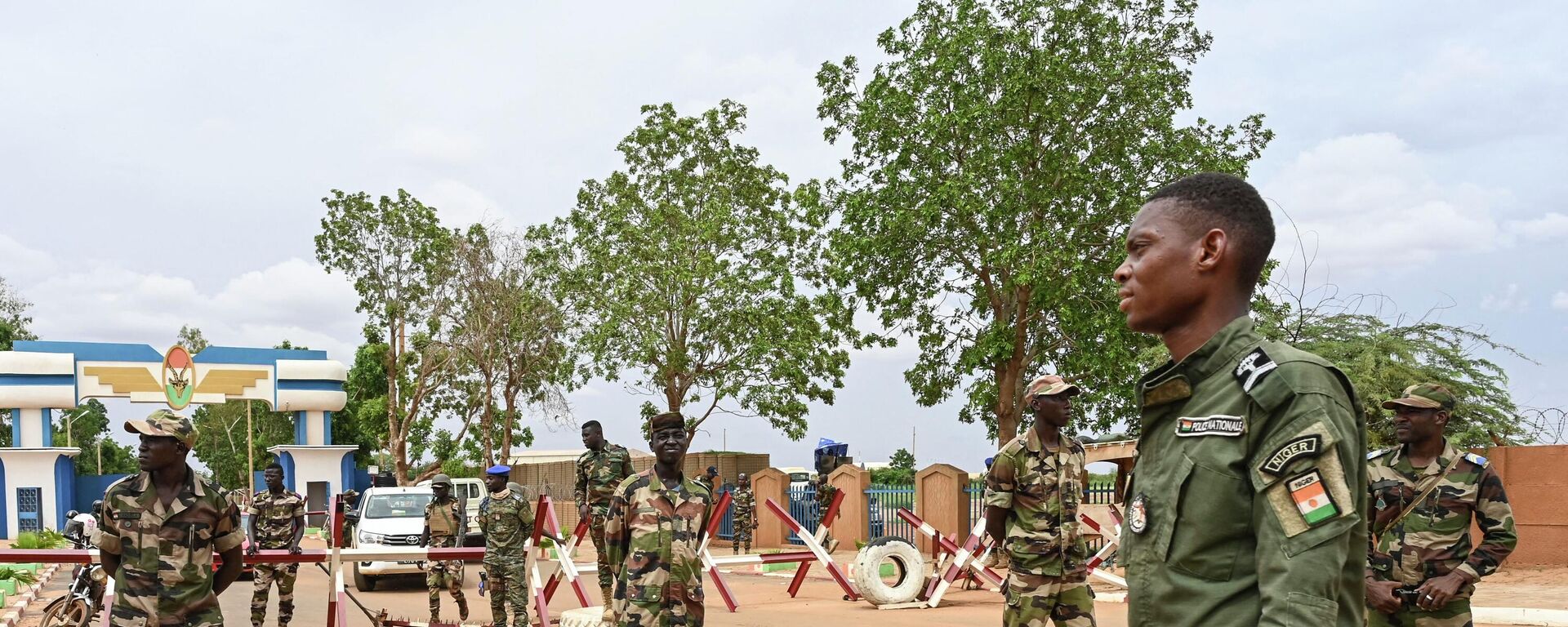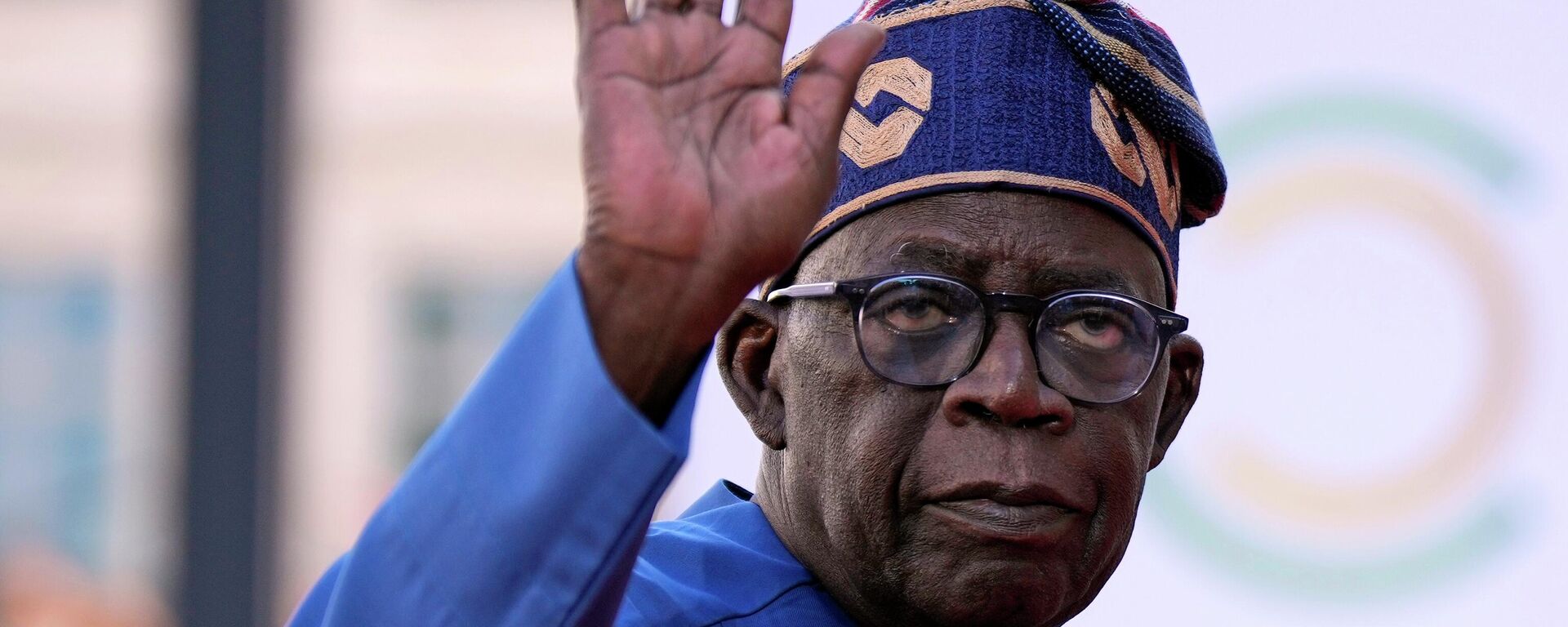https://en.sputniknews.africa/20230813/west-african-states-reportedly-make-another-attempt-to-dialogue-with-niger-coup-leaders-1061292383.html
West African States Reportedly Try to Dialogue With Niger Coup Leaders Again
West African States Reportedly Try to Dialogue With Niger Coup Leaders Again
Sputnik Africa
Niger's military ousted President Mohamed Bazoum and took over the country last month, drawing condemnation from the Economic Community of West African States... 13.08.2023, Sputnik Africa
2023-08-13T11:08+0200
2023-08-13T11:08+0200
2023-08-13T11:39+0200
situation in niger after military coup
west africa
niger
military
military coup
intervention
economic community of west african states (ecowas)
mohamed bazoum
abdourahamane tiani
https://cdn1.img.sputniknews.africa/img/07e7/08/0d/1061293615_0:161:3071:1888_1920x0_80_0_0_5554140c1458adee3fe9ce9d87bb1f09.jpg
West Africa's ECOWAS bloc is going to send a parliamentary committee to Niger to meet mutineers who seized power in the country in late July, media has reported, citing a parliament spokesperson. The move is seen as a further diplomatic effort by the bloc to restore civilian rule in Niger.On Saturday, the ECOWAS parliament held a meeting to discuss the political situation in the West African nation and the bloc's next steps to address the crisis. It was reported that the parliament didn't come up with any specific decision.However, it did set up a committee to meet with Nigerian President Bola Tinubu, who holds the rotating chairmanship of the bloc, to get his permission to travel to Niger for talks with the coup leaders. According to a Nigerian media outlet, members of the parliament expressed differing opinions on the option of military action to restore democracy in Niger, with some insisting on the use of diplomacy and dialogue to resolve the situation.The media, citing a Nigerian presidential source, reported that a group of the country's prominent Islamic scholars led by Sheikh Abdullahi Bala Lau met with Tinubu to seek his permission to intervene, which was eventually granted. They planned to meet with Niger's rebels, as well as religious leaders, in an effort to break the diplomatic deadlock. Earlier this week, two Nigerian envoys who were allowed into Niger despite the full border closure, met with the country's military leaders in hopes of finding a diplomatic solution to the current crisis and embarking on a peace process.According to media reports, a high-level delegation of envoys from the African Union, ECOWAS, and the United Nations planned to visit the country for talks with the rebels. But the coup leaders said the threat of sanctions and possible invasion by ECOWAS had sparked public outrage, making it unsafe to host their delegation safely.On August 10, West African leaders gathered for a second extraordinary summit on the situation in Niger to shape ECOWAS policy towards the military coup, which the regional bloc had earlier condemned, imposing sanctions against the rebels. In its final communique from the meeting, the group ordered the activation and deployment of the bloc's reserve troops as a response to the military takeover in Niger. The organization added, however, that members remain committed to a return to constitutional order "through peaceful means" and to keeping all options on the table to achieve this. Nigerian President Tinubu, who chaired the summit, said the priority of negotiation and dialogue was crucial as the basis of their approach to Niger.Later, French media reported that a meeting of the ECOWAS military command on the situation in Niger had been postponed for technical reasons. The ECOWAS chiefs of staff are expected to meet on August 14 instead of August 12. The main purpose of the meeting is to brief the organization's leadership on the "best options" for the deployment of the reserve force.According to ECOWAS Commissioner for Peace and Security Abdel-Fatau Musah, the regional bloc can intervene in Niger without UN approval.He noted that ECOWAS had previously informed the UN of its actions following the military coup. According to Musah, Niger's army leaders supported the removal of President Bazoum only to avoid bloodshed. At the same time, he added, there is still no public consensus in the country regarding the coup.In late July, Niger's military announced on national television that it had removed President Bazoum from power. Most Western leaders and ECOWAS condemned the coup, urging the military to restore constitutional order in the country. In early August, leaders of the regional bloc ECOWAS adopted a plan for military intervention in Niger, however, stressing that this option would be a "last resort."
https://en.sputniknews.africa/20230813/leader-of-nigers-coup-tells-nigerian-delegation-about-need-to-lift-sanctions-1061292819.html
https://en.sputniknews.africa/20230810/negotiations-should-become-paramount-approach-to-niger-nigerian-president-says-1061225829.html
west africa
niger
Sputnik Africa
feedback@sputniknews.com
+74956456601
MIA „Rossiya Segodnya“
2023
News
en_EN
Sputnik Africa
feedback@sputniknews.com
+74956456601
MIA „Rossiya Segodnya“
Sputnik Africa
feedback@sputniknews.com
+74956456601
MIA „Rossiya Segodnya“
west africa, niger, military, military coup, intervention, economic community of west african states (ecowas), mohamed bazoum, abdourahamane tiani
west africa, niger, military, military coup, intervention, economic community of west african states (ecowas), mohamed bazoum, abdourahamane tiani
West African States Reportedly Try to Dialogue With Niger Coup Leaders Again
11:08 13.08.2023 (Updated: 11:39 13.08.2023) Niger's military ousted President Mohamed Bazoum and took over the country last month, drawing condemnation from the Economic Community of West African States (ECOWAS). The regional bloc recently activated a standby military force, threatening to use it as a last resort if negotiations fail.
West Africa's ECOWAS bloc is going to send a parliamentary committee to Niger to meet mutineers who seized power in the country in late July, media has reported, citing a parliament spokesperson. The move is seen as a further diplomatic effort by the bloc
to restore civilian rule in Niger.
On Saturday, the ECOWAS parliament held a meeting to discuss the political situation in the West African nation and the bloc's next steps to address the crisis. It was reported that the parliament didn't come up with any specific decision.
However, it did set up a committee to meet with Nigerian President Bola Tinubu, who holds the rotating chairmanship of the bloc, to get his permission to travel to Niger for talks with the coup leaders. According to a Nigerian media outlet, members of the parliament expressed differing opinions on the option of military action to restore democracy in Niger, with some insisting on the use of diplomacy and dialogue to resolve the situation.
The media, citing a Nigerian presidential source, reported that a group of the country's prominent
Islamic scholars led by Sheikh Abdullahi Bala Lau met with Tinubu to seek his permission to intervene, which was eventually granted. They planned to meet with Niger's rebels, as well as religious leaders, in an effort to break the diplomatic deadlock.
Earlier this week, two Nigerian envoys who were allowed into Niger despite the full border closure, met with the country's military leaders in hopes of finding a diplomatic solution to the current crisis and embarking on a
peace process.
According to media reports, a high-level delegation of envoys from the African Union, ECOWAS, and the United Nations planned to visit the country for talks with the rebels. But the coup leaders said the threat of sanctions and possible invasion by ECOWAS had sparked public outrage, making it unsafe to host their delegation safely.
On August 10, West African leaders gathered for a second extraordinary summit on the situation in Niger to shape ECOWAS policy towards the military coup, which the regional bloc had earlier condemned, imposing sanctions against the rebels. In its final communique from the meeting, the group ordered the activation and deployment of the bloc's
reserve troops as a response to the military takeover in Niger.
The organization added, however, that members remain committed to a return to constitutional order "through
peaceful means" and to keeping all options on the table to achieve this. Nigerian President Tinubu, who chaired the summit, said the priority of negotiation and dialogue was crucial as the basis of their approach to Niger.
Later, French media reported that a meeting of the ECOWAS military command on the situation in Niger had been
postponed for technical reasons. The ECOWAS chiefs of staff are expected to meet on August 14 instead of August 12. The main purpose of the meeting is to brief the organization's leadership on the "best options" for the deployment of the reserve force.
According to ECOWAS Commissioner for Peace and Security Abdel-Fatau Musah, the regional bloc can intervene in Niger without UN approval.
"ECOWAS has legitimate grounds to intervene in Niger and does not need the approval of the UN Security Council," he was quoted as saying by media.
He noted that ECOWAS had previously informed the UN of its actions following the military coup. According to Musah, Niger's army leaders supported the removal of President Bazoum only to avoid bloodshed. At the same time, he added, there is still no public
consensus in the country regarding the coup.
In late July, Niger's military announced on national television that it had removed President Bazoum from power. Most Western leaders and ECOWAS condemned the coup, urging the military to restore constitutional order in the country. In early August, leaders of the regional bloc ECOWAS adopted a plan for military intervention in Niger, however, stressing that this option would be a "last resort."



